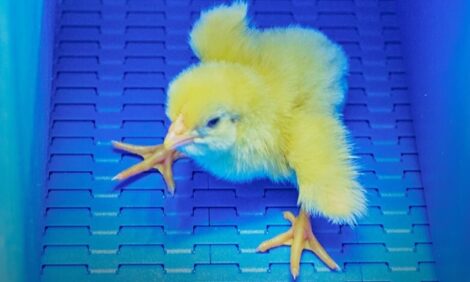



Global Efforts to Control Necrotic Enteritis
Necrotic enteritis causes significant losses the world's poultry industry from reduced performance. Jackie Linden, editor of ThePoultrySite, reports on some of the work to control the disease that were presented at the International Poultry Scientific Forum 2010.Yeast Extract Reduces Pathogen Count
Necrotic enteritis (NE) disease is caused by Clostridium perfringens (CP), and costs the global poultry industry about $2 billion annually, explained R. Thanissery of Auburn University. Traditionally, NE is controlled with in-feed antimicrobial growth promoters but increasing consumer demand for drug-free poultry has fostered the search for non-antibiotic alternatives.
These include yeast extract formulations known to have immunostimulatory properties. The Auburn experiment was conducted to evaluate the efficacy of NuPro® yeast extract in reducing intestinal C. perfringens levels in broiler chickens.
They found that dietary supplementation of the yeast extract reduced C. perfringens levels by 1.0-fold and 0.68-fold compared to a negative control on days 1 and 7 post-challenge, respectively. However, Thanissery and colleagues concluded that these reductions were not significant, and that higher levels (above two per cent) of inclusion may be needed to significantly reduce intestinal C. perfringens levels.
In Vitro Testing of Essential Oils
Also from Auburn University, Macklin and Krehling presented their work into the effect of essential oils on inhibiting growth of C. perfringens in a poster at IPSF.
They explained that the trend of removing antibiotics from the feed of poultry has caused many broiler companies to seek alternatives, and that one group of alternatives that has shown potential are the essential oils. Essentials oils have been shown to inhibit bacterial growth in vitro and alternating gut microbial but most of this work has been performed with Salmonella and E. coli.
In their trial, 38 unique C. perfringens isolates were tested against 11 essential oils and three antibiotics in a disc diffusion test.
The researchers found that all the bacterial isolates were resistant to tetracycline, yet susceptible to chloramphenicol and both levels of penicillin G. Of the essential oils tested, all of the isolates tested against white thyme and lemon grass were susceptible. C. perfringens isolates were resistant to tea tree oil, black pepper oil, tarragon oil, clove bud oil, comoric basil oil and cinnamon leaf oil. The other essential oils tested – red thyme, Spanish sage and cinnamon bark – showed variable activity against the different C. perfringens isolates with an overall trend of the bacteria being susceptible, said Macklin and Krehling.
Investigating Mode of Action of Bacillus Product
In the introduction to their paper, Knap and colleagues from Chr-Hansen in Denmark explained that Bacillus licheniformis can prevent necrotic enteritis in C. perfringens challenge studies. They performed new studies to understand both the mode of action of the necrotic enteritis-preventing effect of the product and performance under non-challenge conditions.
They reported that three C. perfringens challenge studies were carried out at Southern Poultry Research, Inc.: two cage studies and one floor-pen study. Different doses of Bacillus spores were tested from 105 to 107 CFU/G, and all studies included a non-challenged control group, challenged group without additive and a positive control with virginiamycin.
In all challenged trials, a significant effect was seen of using Bacillus with regard to lesion score, mortality, weight gain and FCR. There was no significant difference between the Bacillus and virginiamycin treatments in terms of mortality or lesion score. A dose of 1.6 × 106 CFU/G feed seems to be optimal to prevent necrotic enteritis.
In a non-challenged trial using a water application of the Bacillus from day 11 to 21, a significant effect on average weight gain at day 42 was seen. FCR and mortality were also improved in the Bacillus group.
In laboratory studies growing Bacillus together with an alpha-toxin producing strain of C. perfringens resulted in a significant reduced the level of alpha-toxin, according to Knap and colleagues.
Lactylate Reduces Severity of Sub-Clinical Infection
Dr Jan Dirk van der Klis of Schothorst Feed Research in the Netherlands explained that, together with co-authors from the company, Purac, he tested the efficacy of lactylate (an ester of a fatty acid and the hydroxyl group of lactic acid) during a Clostridium infection in broilers.
They carried out a dose-response study with day-old broilers were fed a starter diet from days 0 to 9 followed by a wheat/barley-based grower diet until day 37.
As well as two control treatments (non infected, untreated and infected, untreated), eight diets with graded levels of lactylate (Puramix 30 from Purac) ranging from 0.005 to 0.6 per cent to infected birds and one (0.3 per cent Puramix 30) to uninfected broilers.
On day 9, infected birds were orally inoculated with 10,000 sporulated E. maxima oocysts in 1 ml saline and at day 14, with 108 cfu C. perfringens.
Lactylate significantly decreased the severity of lesions (P<0.05; 1.6 versus 0.9), based on a linear dose response relationship up to the maximum inclusion level used. This same level also resulted in a significant lower mortality rate (P<0.05).
From their results, the researchers concluded that the lactylate product was effective in controlling Clostridium infections in broilers by reducing the incidence and severity of necrotic lesions. Although it did not significantly affect production performance, mortality rate was reduced.
References
Knap I, B.T. Lund and E.U. Augustsson. 2010. Prevents necrotic enteritis by use of Bacillus licheniformis (GalliPro Tect) and improves performance in broiler chickens. Proceedings of International Poultry Scientific Forum 2010, Atlanta, US. M66.
Macklin K.S. and J.T. Krehling. 2010. The effect of essential oils on inhibiting growth of Clostridium perfringens. Proceedings of International Poultry Scientific Forum 2010, Atlanta, US. P169.
Thanissery R., J.L. McReynolds, D.E. Conner, K.S. Macklin, P.A. Curtis and Y.O. Fasina. 2010. Evaluation of the efficacy of NuPro®-yeast extract in reducing intestinal Clostridium perfringens levels in broiler chickens. Proceedings of International Poultry Scientific Forum 2010, Atlanta, US. M65.
van der Klis J.D., M. Lensing and A. Cazemier. 2010 Lactylate in broiler diets reduces severity of subclinical clostridium infection. Proceedings of International Poultry Scientific Forum 2010, Atlanta, US. M70.








